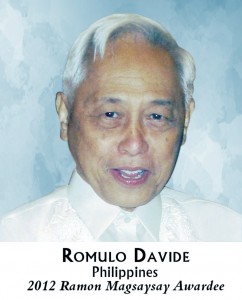CEBU CITY—The timing couldn’t have been more perfect.
Romulo Davide, 78, was in Siquijor on July 26 to prepare for the graduation of 300 beneficiaries of the Farmer Scientists Training Program (FSTP) when he received the good news.
He could not believe it at first when he was told by the Inquirer that he won the 2012 Ramon Magsaysay Award, Asia’s version of the Nobel Peace Prize.
“You surprised me,” Davide said in a phone interview.
He said the award would inspire him to do more for the farmers whom he believed were the country’s real heroes.
“We have to take care of our farmers. With the Ramon Magsaysay Award, we will be more inspired and encouraged to continue the ideals and spirit of (the late) President Ramon Magsaysay. It will inspire us to do more,” he said.
Second in family
Davide is the second in his family to win the prestigious award. His younger brother, former Chief Justice Hilario Davide Jr., was a Ramon Magsaysay awardee for government service in 2002.
But the family is just as proud of Romulo Davide.
“We are thankful for the Ramon Magsaysay Foundation and we, I in particular, are proud of our uncle for what he has contributed (to the country),” said former Councilor Hilario Davide III, a son of Hilario Jr.
He described his uncle as a humble and jolly man who is solicitous of his nephew and nieces. Romulo Davide is married to Clara Davide, a retired professor.
Hilario III said his grandfather, Hilario Davide Sr., a public school teacher, taught his children the value of education and how to till the soil.
The Davide children, including Romulo and the former Chief Justice, were tasked with tending the farm and raising their livestock.
“(My uncle) saw potential in the farmers. Despite their contribution of providing us food, their lives have not improved. So he thought of helping them,” said Hilario III.
Favorite story
He recalled that his uncle’s favorite story was about a farmer who was able to buy a cellular phone and a multipurpose cab, two years after adopting the scientific method of farming.
Romulo has lived by the words of his father—“there are no barren soils, only barren minds”—instilled in his children.
He believes that farmers shouldn’t be poor because the resources are available to them. What they need is to change their mind-set and open their minds to new methods.
Innovative
That is the essence of the FSTP, described by the Ramon Magsaysay Foundation as “an innovative and multi-faceted program” that aims to turn farmers into scientists who would be able to do experiments, discover effective techniques, manage the market and increase production.
Romulo said the program sought to teach farmers the scientific way of farming in order to increase productivity.
The FSTP, which has three phases, doesn’t only cultivate the mind but also includes spiritual conversion and material transformation, he added.
The first phase is to meet farmers and teach them new methods of farming using various experiments to determine what works better in the field.
It has a value formation component that teaches the farmer to “love God, country and people.”
Intercropping
The actual farming happens in the second phase in which farmers implement methods that work best in their situation. Usually, they conduct intercropping—high-yielding variety of corn is raised simultaneously along with either mongo, peanuts or “camote” (sweet potato). The farmers are also encouraged to raise livestock to increase their income.
In the third phase, the farmers graduate from the program with a harvest of least three tons of corn. They also become “scientists” by allowing themselves to teach fellow farmers to sustain the program.
Diploma
Their diplomas are signed by the University of the Philippines Los Baños College of Agriculture and a regional university in the area—the only program to do so.
“You give the farmers the dignity of being farmers,” Davide said. “Our farmers deserve such a recognition being real heroes of the country.”
Other training sessions don’t provide farmers seedlings, according to Davide. But in the FSTP, high-yielding varieties of corn, sweet potato, peanuts and other crops are given to the farmers.
How program began
Davide started the program in 1994, using the award money given to him when he was named “Outstanding Agricultural Scientist” by the Department of Agriculture.
Davide selected his hometown, Barangay Colawin in Argao, as the pilot area. From 74 farmers in Colawin, the program spread to 35 towns in Cebu and 6 other provinces by 2007.
He was in Siquijor attending the graduation of 300 FSTP beneficiaries at the covered court of San Juan town on Siquijor island. The farmers were from Lasi, Larena, San Juan and Siquijor towns.
Professor emeritus
From Siquijor, he would go back to UP Los Baños in Laguna where he is professor emeritus before going to Agusan and later to Bukidnon for the program.
Davide said he did not know that he had been nominated for the Ramon Magsaysay Award although someone earlier asked some information about him.
He was visiting a church in Siquijor town when he received a text message from a colleague that he had been nominated.
He didn’t know he actually won until the Inquirer called him up to interview him about the award.
Davide said he didn’t expect the award which he described as recognition of the work in the FSTP, designed to liberate the farmers from the bondage of poverty and hunger.
He recognized the huge impact of the award on the program, which he planned to expand so more farmers would be benefited.
“With the award, we will be able to expand the program. More will support us,” he said.
Davide vowed to uphold the ideals of former President Ramon Magsaysay who had championed the causes of the masses, especially the farmers.
“(The farmers) are the real heroes of the land. Without the farmers, what will we eat?” he said.
